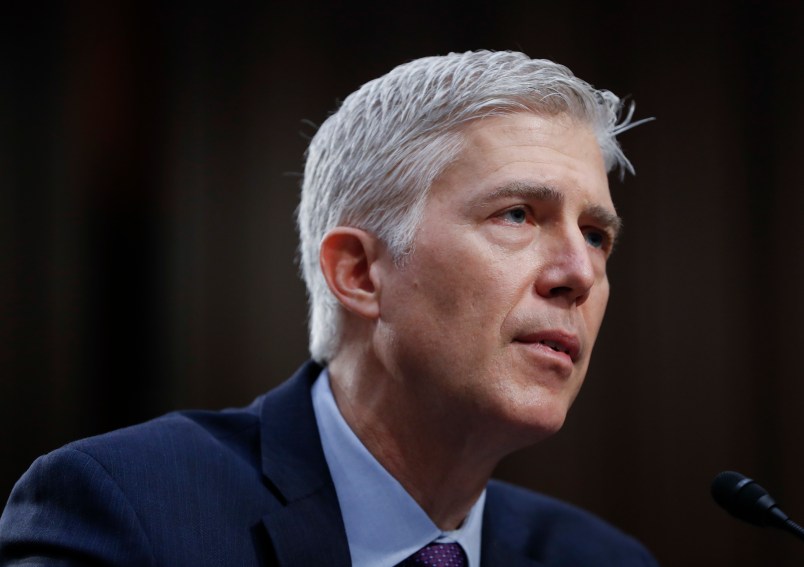Asked about Roe v. Wade, the landmark 1973 Supreme Court decision that guaranteed abortion rights nationwide, Judge Neil Gorsuch stopped short Tuesday of fully endorsing the decision, but suggested he would “consider it as precedent” and viewed it as “worthy as treatment of precedent like any other. “
“It has been reaffirmed, the reliance interest considerations are important there, and all of the other factors that go into analyzing precedent have to be considered. It is a precedent of the United States Supreme Court,” Gorsuch said at the second day of his confirmation hearings. “It was reaffirmed in Casey in 1992, and in several other cases. So a good judge will consider it as precedent of the United States Supreme Court worthy as treatment of precedent like any other. “
The comments came in a line of questions from Judiciary Chair Chuck Grassley (R-IA) that sought to inoculate Gorsuch from questions from Democratic senators that would probe him on controversial cases. Grassley also asked him about controversial rulings on gun rights, campaign finance and other issues, and Gorsuch responded by opining broadly about precedent while arguing that divulging his personal views on these cases would hinder is abilities as a judge.
Sen. Dianne Feinstein (D-CA), the top Dem on the committee, returned to the Roe v. Wade decision in her questioning and pointed to comments made by Trump on the campaign trailing vowing to appoint a Supreme Court justice who would overturn the ruling.
Gorsuch elaborated on what he told Feinstein in their private meeting earlier on in the confirmation process.
“Part of the value of precedent, it has lots of value, it has value in and of itself because it’s our history, and our history has value intrinsically. But it also has an instrumental value in this sense: it adds to the determinacy of law,” Gorsuch said. “We have lots of tools that allow us to narrow the realm of admissible dispute between parties. So that we can — people can anticipate and organize their affairs.”







We all know how Right Wing “Constitutional Originalists”, or whatever the hell they style themselves as, respect precedent. They respect it when it suits their ideological template.
Every single rightwing justice up for a position on the Supreme Court in my lifetime has said about the same thing when asked, and then once on the court has routinely ignored or suddenly forgotten they made that comment…and not just in regards to abortion. As in so many other “hot-button” issues they lie to get through the hearings and once seated on the court have regularly ignored precedent. That’s how we have a decimation of campaign finance laws and less voter protections now. Rightwing judges have all proven to be political hacks, only interested in preserving partisan gains through their decision-making and rulings. I’d put Gorsuch’s response in that same category. He’s full of shit. Just another fucking weasel.
If Dems vote for this guy, they’re basically telling half of the country (actually more than half) that so long as you can stall and deny a Democratic President his own choice at filling a seat on the highest court for a year, a Republican replacement is just fine by them. I don’t care if he’s good, bad or just plain vanilla mediocre…He will be and is already illegitimate…and he’s coming from a President that in all likelihood will be impeached or forced to resign. There’s no good reason to vote for this man, no matter how you slice it. And, McTurtle going nuclear, to eliminate the filibuster thereby only requiring a simple majority, is also not a good reason. He will do, what he will do…Threats only make him look weak and desperate to manipulate the outcome. That’s what these people have done, will do, that pisses people off, in that they keep doing this to the country to get their way by changing the goal posts and the rules whenever it suits them.
Most people have had enough of that.
Translation: “PLEASE, PLEASE, PLEEEEEEEEASE LET ME IN!”
“Part of the value of precedent, it has lots of value, it has value in and of itself because it’s our history, and our history has value intrinsically. But it also has an instrumental value in this sense: it adds to the determinacy of law,” Gorsuch said. “We have lots of tools that allow us to narrow the realm of admissible dispute between parties. So that we can — people can anticipate and organize their affairs.”
So not a lawyer here but I read this as “Hey black folks get your affaires in order because slavery is coming back.” We can also add “Hey wimmens your right to vote, we think not so much and you better be back in that kitchen making us some sandwiches.”